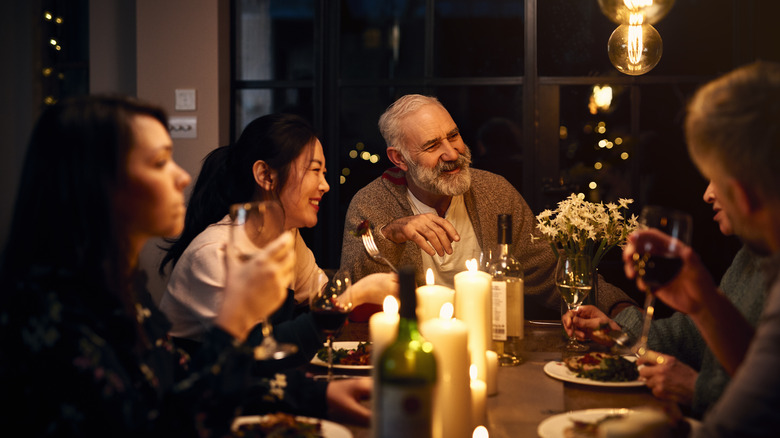Rick Steves' Top Tip For A Flawless Stay With European Locals
If you're planning to stay in Europe and you're looking for an alternative housing experience, chances are you'll be staying with locals. Or, at the very least, interacting with them regularly in hotels and inns. While hotels are available in major cities and larger towns, Airbnbs, cultural exchange programs, and other kinds of homestays are just as common — and a cheap and culturally-rich way to experience another country. If you plan to spend any portion of your trip with locals, travel expert Rick Steves has some tips for a smooth stay. In the process, you might also avoid doing some of the 10 things tourists do that drive locals up a wall.
Steves says, in these bunking situations, you're not just a guest in someone's home, but a guest in their corner of the world as well, so it's good to come prepared to be a good guest. Part of this is coming into your trip with some knowledge of the local customs (including things like the European philosophy around air conditioning), or as Steves calls it, doing your "cultural homework." Steves advises on his website, "Some awkwardness is inevitable — expect to make a faux pas or two. Limit embarrassing blunders by researching, before you arrive, etiquette in the country you're visiting."
Along those lines, arrive at your destination prepared with some words and phrases in the language of the country you're visiting. You don't have to be fluent in Spanish, French, or Greek, but you should know some basics — especially if you plan to stay with European locals. Being able to say hello, goodbye, please, and thank you in the native language shows effort and respect when traveling, even if your host or host family is fluent in English. Which, American travelers sometimes need reminding, they may not be.
Communicate effectively with your host
Rick Steves' last two tips both revolve around communication. English is not widely spoken everywhere, especially once you leave major cities and touristy spots. Learning some of the language of the country you're visiting is not only respectful, but also may be necessary. Aside from overcoming basic language barriers, Steves notes that you should communicate well with your host or locals who may be accommodating you during your stay.
For one, Steves urges travelers to not be afraid to ask their host for guidance, saying "People who are OK [sic] with welcoming guests in their home are usually friendly, interested in others, and eager to show off their town ... Many hosts happily provide maps, sightseeing and transit information, and advice on how to make the most of your time." Locals will also have a better sense of how to get around your destination than, say, a travel blogger might, as they live there year-round.
Lastly, Steves says that if you plan to stay with a local, be sure you're communicating your plans with them. Some stays may work a little differently in someone's home than they do in a hotel, and you won't be free to come and go at any hour without disturbing someone. Warn your host of your arrival and departure plans, and don't cancel or change plans last minute if it can be avoided. "Clear communication and a focus on being considerate are critical when trying to bridge a linguistic or cultural divide," as Steves puts it. With these tips in mind, you can expect to have a unique and expansive experience staying with European locals. If you're looking for more ways to save money, be sure to check out Rick Steves' budget-friendly ways to enjoy many European cities.

